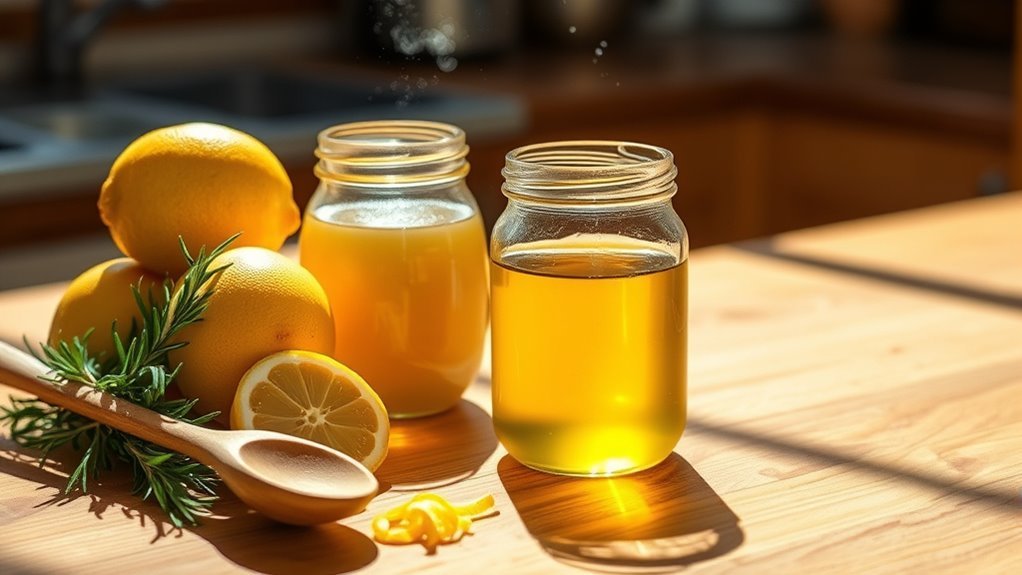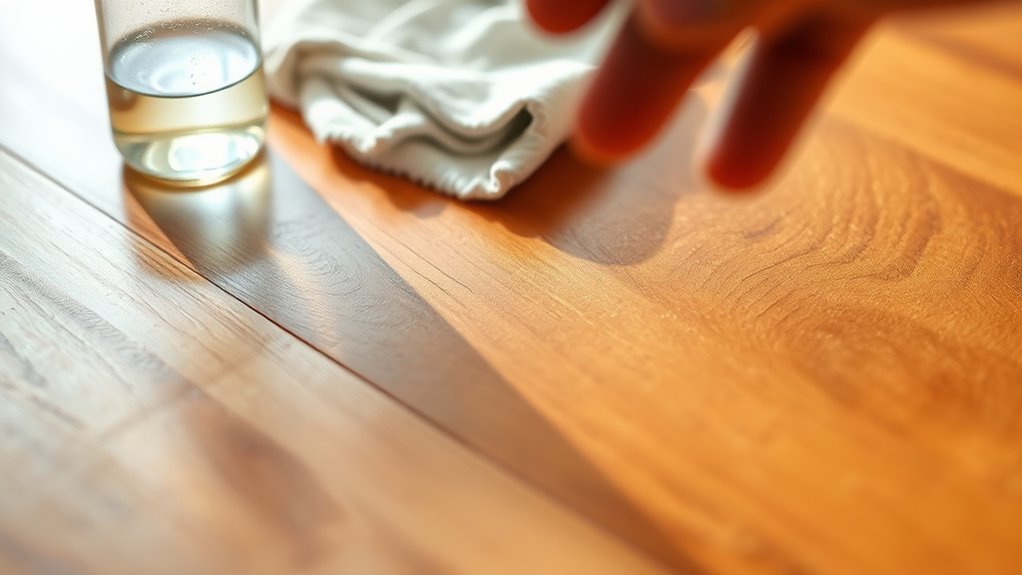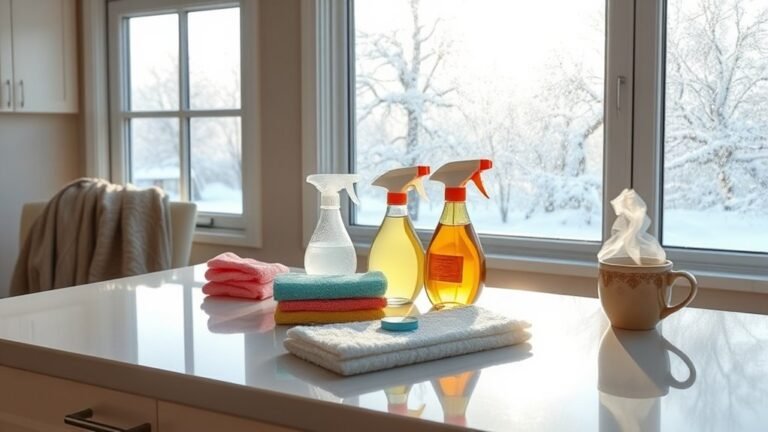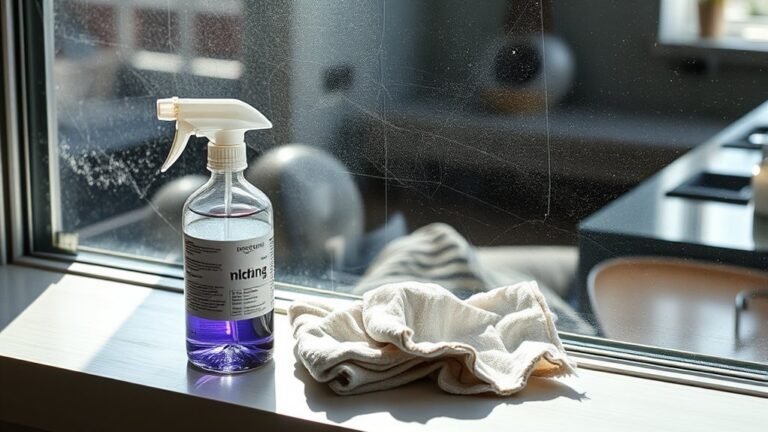DIY Cleaner for Wood
You can make a homemade wood cleaner using simple ingredients like vinegar, olive oil, lemon juice, and mild dish soap. These natural solutions clean gently, nourish your wood, and avoid harsh chemicals that can damage finishes. Mix small batches, test on hidden spots, and apply with a soft cloth, wiping along the grain to keep your wood looking its best. If you want tips on recipes and proper care, there’s plenty more to explore.
Benefits of Using Homemade Wood Cleaner

While many commercial wood cleaners can be effective, making your own homemade wood cleaner gives you control over the ingredients, ensuring they’re safe for your furniture and the environment. When you choose eco friendly alternatives, you reduce harmful chemical exposure, protecting both your health and the planet. Plus, you avoid the mystery of unknown additives that often come with store-bought options. Homemade cleaners offer cost effective solutions, saving you money by using simple, everyday ingredients rather than pricey commercial formulas. This freedom lets you tailor your cleaner to your specific needs and preferences, giving you peace of mind. Embracing DIY wood cleaning empowers you to maintain your furniture sustainably, responsibly, and economically, all while enjoying the satisfaction of doing it yourself.
Essential Ingredients for DIY Wood Cleaners
Before you start mixing your own wood cleaner, it helps to know which ingredients work best to clean and protect your furniture effectively. Choosing natural, versatile components lets you maintain your wood’s beauty without harsh chemicals. Here are five essential ingredients to keep on hand:
- Vinegar solution: Great for breaking down grime and disinfecting surfaces.
- Olive oil: Nourishes wood, restoring shine and preventing drying.
- Mild dish soap: Cuts through dirt gently without damaging finishes.
- Lemon juice: Adds a fresh scent and natural antibacterial properties.
- Distilled water: Guarantees no mineral deposits are left behind.
With these, you’re free to create eco-friendly, effective cleaners that respect both your wood and your space.
Step-by-Step Recipes for Natural Wood Cleaners

Now that you know which ingredients work best, it’s simple to mix up your own natural wood cleaners. These eco friendly options give you freedom from harsh chemicals and offer safe alternatives for your home. Here’s a quick guide to get you started:
| Cleaner Type | Ingredients | Benefits |
|---|---|---|
| Citrus Boost | Lemon juice + olive oil | Restores shine, fresh scent |
| Vinegar Fresh | White vinegar + water | Cuts grease, disinfects |
| Baking Soda Paste | Baking soda + water | Removes stains gently |
| Oil Polish | Olive oil + essential oils | Nourishes wood, natural aroma |
Mix small batches, test on hidden areas, and enjoy your wood’s natural beauty without compromise. You’re in control with these safe alternatives that respect both your space and the planet.
Tips for Applying and Maintaining Wood Surfaces
Once you’ve prepared your natural cleaner, applying it properly guarantees your wood surfaces stay beautiful longer. Embracing good wood care techniques guarantees lasting surface protection and frees you from constant maintenance worries. Here’s how to keep your wood looking its best:
Proper application of natural cleaner ensures wood stays beautiful longer with lasting protection and less maintenance.
- Use a soft cloth or sponge to apply the cleaner evenly without scratching.
- Wipe along the grain to maintain the wood’s natural texture.
- Avoid soaking the wood; a damp cloth prevents damage.
- Let surfaces air dry completely before use to lock in protection.
- Regularly dust and clean to prevent buildup and preserve the finish.
Common Mistakes to Avoid When Cleaning Wood

Although cleaning wood surfaces seems straightforward, you might unintentionally cause damage if you’re not careful. One common mistake is over cleaning surfaces. Constant scrubbing or excessive wiping can wear down the finish and expose the raw wood beneath. Another pitfall is using harsh chemicals. Many commercial cleaners contain ingredients that strip oils and dull the wood’s natural beauty, robbing you of its warm character. Instead, opt for gentle, homemade solutions tailored for wood. Also, avoid soaking wood with water, as it can cause warping or cracking over time. By steering clear of these errors, you maintain your wood’s integrity and enjoy its freedom to age gracefully, preserving its charm without unnecessary damage or dullness.
Häufig gestellte Fragen
Can DIY Wood Cleaners Be Used on Antique Furniture?
You can use DIY wood cleaners on antique furniture, but you’ve got to be careful to protect antique preservation and delicate wood finishes. Homemade solutions might be gentler, but they can still strip or damage finishes if not tested first. Always try your cleaner on a hidden spot before applying it broadly. Taking these steps lets you maintain your freedom to care for your treasures while respecting their unique, fragile nature.
How Often Should I Clean Wood Surfaces With Homemade Cleaners?
You might be surprised how cleaning frequency depends on your surface type—hardwood floors need less frequent attention than kitchen counters. For wood surfaces, once a week or every two weeks usually works well, but your lifestyle’s freedom lets you adjust that. If your space sees lots of traffic or spills, you’ll want to clean more often. Trust your gut and keep your wood looking great without feeling chained to a strict schedule.
Are Homemade Wood Cleaners Safe for Pets and Children?
You’ll find that homemade wood cleaners can be great for pet safety and child safety since they often use natural ingredients without harsh chemicals. Still, it’s smart to test a small area first and keep pets and kids away until surfaces dry. This way, you enjoy the freedom of using safer products while protecting your loved ones from potential irritants or residues. Always store your mixtures securely to avoid accidental exposure.
Can DIY Wood Cleaners Remove Tough Stains or Water Rings?
You might wonder if DIY solutions can handle tough stain removal or water damage on wood. While homemade cleaners can be effective for light stains and minor water rings, they may struggle with deeper or older marks. You’ll often need specialized products or gentle sanding for stubborn spots. Still, trying your own mix gives you freedom to customize ingredients, avoiding harsh chemicals while caring for your wood’s natural beauty.
How Should I Store Leftover Homemade Wood Cleaner?
They say, “A stitch in time saves nine,” and storing your homemade cleaner properly now prevents future headaches. You should keep it in airtight, proper containers like glass jars or sturdy plastic bottles to maintain its effectiveness. Store it in a cool, dark place to extend storage duration and avoid sunlight or heat, which can degrade the ingredients. This way, you’ll have your cleaner ready whenever freedom calls for a quick clean-up.






